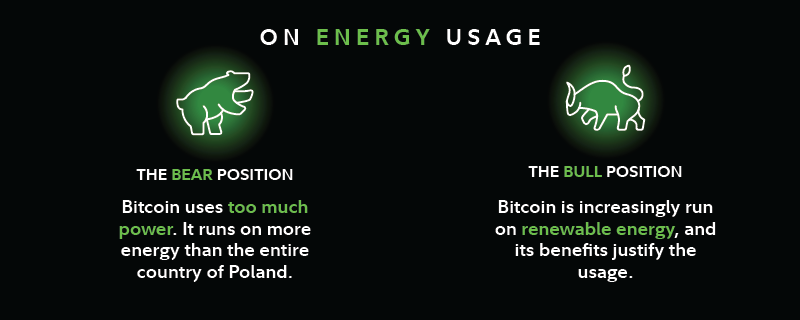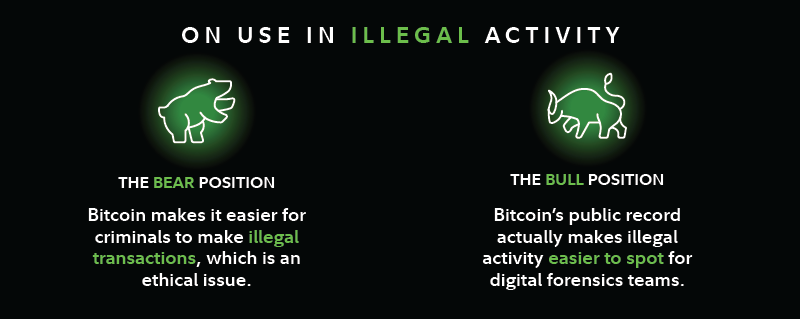Bitcoin's popularity is growing, but not everyone is convinced it's a good investment. Several publicly traded companies hold over 9 figures in the cryptocurrency on their balance sheet, while Warren Buffett has repeatedly questioned its value. So should you consider investing in bitcoin? Let’s look at 6 of its most popular criticisms (which we'll call “bear” arguments) and their counterarguments (appearing below as the “bull” arguments).
Can someone explain the volatility?

The bear argument Critics argue bitcoin is too volatile to be a reliable currency. Daily fluctuations of 5 percent are ordinary, not to mention occasional double-digit price moves. During its most recent bear market (from November 2021 to November 2022), it dropped nearly 80% from its all-time high. While it has since rallied back to make a new all-time high, bears argue the big fluctuations make it an unreliable asset.
The bull argument Bitcoin advocates say the volatility is understandable because bitcoin is still in the early stages of adoption.
Research from Fidelity Digital Assets® suggests that the overall volatility is decreasing, and could continue to drop.1 Advocates believe that if the current trend of increasing adoption holds (meaning more people continue to buy and hold bitcoin), price stability will increase, and fluctuations will decrease.
But does it work for payments?
The bear argument Critics say bitcoin is too inefficient to work as a means of payment. Case in point: It currently takes 10 minutes on average to process a single bitcoin transaction. In contrast, credit cards (and cash) take seconds. You may also incur capital gains tax on the transaction. Bears say it's impractical for daily uses like buying groceries and paying for movie tickets.
The bull argument Advocates argue bitcoin is already more efficient than credit cards. While credit card transactions are processed in seconds, they take days to officially settle, while bitcoin transactions are finalized in an average of 10 minutes.
Bitcoin bulls also argue third-party solutions are solving the inefficiency problem. For example, bitcoin payments process in as little as milliseconds through a third-party protocol called Lightning Network. Advocates expect future innovations will only make paying with bitcoin more efficient.
What about the environmental concerns?

The bear argument One of the loudest arguments against bitcoin is that it relies on massive computing power. For example, according to the University of Cambridge's Bitcoin Electricity Consumption Index,2 it takes more energy to run bitcoin than it does to power the entire country of Poland. Critics argue bitcoin isn't worth these emissions.
The bull argument Despite the energy requirements, advocates argue bitcoin is increasingly run on renewable sources. For example, according to the Bitcoin Mining Council,3 a vocal advocate for bitcoin, over 60% of bitcoin mining used sustainable electricity, as of late 2023. As renewable energy gets cheaper, going eco-friendly could help miners maximize profits.
Advocates also argue bitcoin's benefits justify the energy usage, especially when compared to more discretionary uses of energy. For example, the Center for Global Development holds that Christmas lights likely consume more energy than the Bitcoin network.
Don't criminals use it?

The bear argument While criminal transactions are made with all kinds of currencies, critics argue that bitcoin and cryptocurrencies make these kinds of transactions even easier. In the past, government officials have worried that cryptocurrencies are enabling dark web purchases, money laundering, and other illegal activity. Their concerns are not entirely unfounded, as there have been incidents where crypto has been used to facilitate these kinds of transactions.
The bull argument Advocates cite statistics that show cryptocurrency is mostly used for legal transactions. One example is a report4 by former CIA Acting Director Michael Morell, which concludes that criminal bitcoin usage "is certainly not higher than it is in the traditional banking system and is most likely less."
Another argument in bitcoin's favor is that its public record can make illegal activity easier to spot. As digital forensics departments get better at tracking blockchain transactions, criminals may find it increasingly difficult to use cryptocurrencies.
But does it have real value?
The bear argument One of the biggest criticisms of bitcoin is that it's not backed by any meaningful value. Advocates may say its value lies in the fact that there will only ever be 21 million bitcoins, but skeptics argue scarcity alone is not enough to justify its value. Thus far, it has not been used as a currency in the way its pseudonymous founder Satoshi Nakamoto envisioned. In light of this, many believe it’s essentially a Ponzi scheme, and that its price is inflated by hype.
The bull argument The counterargument is that scarcity is only a small part of what makes bitcoin valuable. Advocates believe bitcoin transforms how money works because it’s decentralized, a feature they believe will protect it from both inflation and dictators. They also argue that it’s proving its worth as a store of value and hedge against inflation, as some countries now hold bitcoin as a reserve asset.
What about competitors?
The bear argument Even some of the industry's biggest supporters think alternative cryptocurrencies could eventually overthrow bitcoin as the largest crypto currency by market cap. One reason: Bitcoin doesn't have a central development team that can improve it, while many others do. That could make it easier for other cryptocurrencies to add new functions and innovate when necessary.
The bull argument Bitcoin die-hards see its lack of a central development team as one of its most important features. They believe this makes it the purest, most decentralized cryptocurrency. Most cryptocurrencies are exploring other blockchain applications, but bitcoin is only concerned with functioning as a peer-to-peer payment network. Advocates see this a competitive advantage, especially when combined with its first mover advantage.
What to consider before buying bitcoin
Whether you align with the bull or bear case, there are a few things to keep in mind before adding bitcoin to your portfolio.
Remember that bitcoin and crypto are highly volatile, and may be more susceptible to market manipulation than securities. Crypto holders do not benefit from the same regulatory protections applicable to registered securities, and the future regulatory environment for crypto is currently uncertain.
Crypto is also not insured by the Federal Deposit Insurance Corporation or the Securities Investor Protection Corporation, meaning you should only buy crypto with an amount you're willing to lose. This may help reduce portfolio impact in case prices drop significantly.


